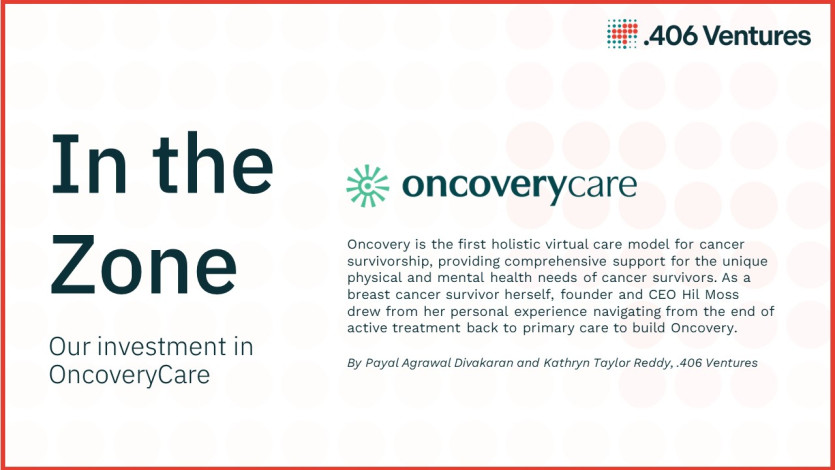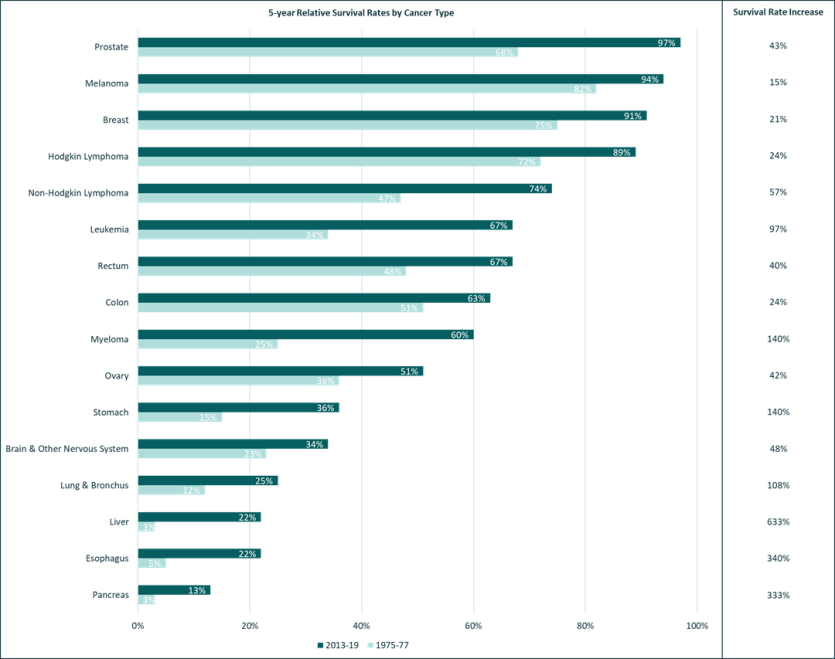
In the Zone | Our Investment in OncoveryCare
May 29, 2024
By Payal Agrawal Divakaran and Kathryn Taylor Reddy, .406 Ventures
“At OncoveryCare, we believe cancer survivorship is the next frontier in cancer care. And in order to build a radical new approach to this phase of care, we knew we had to bring together a dream team of collaborators and investors who were knowledgeable and passionate about this space—and the team at .406 was the perfect partner.”
– Hil Moss, Founder & CEO of OncoveryCare
Cancer Survivorship – What it Means, What has Changed, and Where it’s going
The progress in cancer treatment over the past few decades is truly remarkable. Groundbreaking targeted therapies and immunotherapies have led to a sea change in the effectiveness of treatment for many types of cancer. At the same time, an effort to improve and standardize screening has resulted in diagnosis at earlier stages of disease, when it is far more treatable. Taken together, these advancements have meaningfully improved cancer survival rates and created a rapidly growing population of “survivors.”
Despite (and in many ways because of) these advances, a large gap in patient care has emerged after active treatment ends. Informed by our own thesis work on the cancer survivorship space starting in 2019, .406 gained conviction that addressing this gap was as an opportunity to improve care and lower costs in the system.
The concept of cancer “survivorship” was born in the 1980s and alludes to not just completing treatment, but also to the health and well-being of a cancer patient from the time of diagnosis until the end of life, which can now extend for decades. Advocates for cancer survivors have been vocal that treatment is separate and distinct from the ongoing healthcare needs that come after. The movement highlights the challenges patients face both during and long after treatment. Patients are often left with several medical and mental health issues after cancer treatments, including treatment toxicity, comorbid medical diagnoses, sexual health challenges, and fear and anxiety related to cancer recurrence.
Many of these conditions fall into a ‘no man’s land’ of care. Oncologists are already stretched thin with large panels and waitlists of patients with active cancer diagnoses. Primary care doctors often have little training or background in dealing with the unique medical and behavioral needs of these patients. This means that cancer survivors often have nowhere to turn for reliable, convenient, and compassionate care, resulting in poor outcomes and greater costs for the system.
Growing number of survivors
According to the American Cancer Society’s 2024 publication, the five-year survival rate across all cancers is 69%, up from 49% in the mid-1970s. Two of the most common cancer types (breast and prostate) now have five-year survival rates above 90%. Targeted therapies and immunotherapies have transformed the outlook for certain diagnoses, with particularly impressive progress made across the blood cancers (leukemia, myeloma, and lymphomas).

While survival rates are improving, a worrying trend is the growing rate of ‘early onset’ cancer diagnoses, defined as diagnoses occurring in adults under the age of 50. Between 2010 and 2019, rates of early onset breast and GI cancers increased by 8% and 15%, respectively. Oncologists attribute this increase to better early detection (good news) along with an increase in lifestyle risk factors that have grown the overall disease burden (bad news).
The combination of these factors, along with an aging population, has led to massive growth in the cancer survivor population. As of January 2022, there were an estimated 18 million cancer survivors in the U.S., and this number is expected to grow to 26 million by 2040.
Medical Complexity of Survivorship
According to a Livestrong survey, 91% of cancer survivors reported experiencing one or more physical health concerns and 96% experienced at least one emotional concern after treatment. 70% indicated that their oncologist did not offer support in dealing with non-medical needs, and the remaining 30% indicated that their oncologist was willing to talk about their needs but did not have the resources to address them.
The lack of resources and care for cancer survivors’ complex needs puts these patients at risk for worse outcomes while driving increased medical utilization and spend:
- 70% of cancer survivors have some sort of comorbid condition (e.g. cardiovascular, lymphedema, diabetes, metabolic issues, infertility, or premature menopause)
- Women with a history of breast cancer are at a 8x higher risk of cardiovascular disease
- 42% of breast cancer survivors develop lymphedema, which has an average treatment cost of $3,300 per patient per year
- Cancer survivors are 3x more likely to exhibit clinical levels of depression and 1.5x more likely to exhibit signs of anxiety
The direct medical costs of cancer survivors, after the first year of diagnosis, is estimated to be 1.8x higher than people without a history of cancer.
Evolution of oncologists
When .406 first started exploring this thesis in 2019, survivorship was a matter addressed mainly by community groups and a few academic cancer centers, such as the Dana Farber Cancer Institute, Memorial Sloan Kettering, and UCSF. Across the broader market, oncologists recognized the issue but had little incentive or capacity to address it. However, over the past five years, a confluence of factors is bringing this issue to a head. To begin, oncology faces a major workforce shortage: the American Society of Clinical Oncology is projecting a shortage of over 2,000 oncologists by 2025. Additionally, oncologists must keep up with the rapidly changing field and ever more complex treatment pathways, along with a growing administrative burden as payers look to control costs by implementing prior authorizations for expensive therapies. These factors mean that oncologists have their hands full with patients in active treatment and have little time for non-acute matters. As a result, our work indicated that oncologists are increasingly eager to hand off patients to clinicians who can address complex survivorship needs after patients complete active treatment rather than managing follow-up and consult requests from former patients and their PCPs.
We believe that the ‘hot potato’ dynamic between oncology and primary care will continue to grow along with the size of the survivor population and widening shortage of both oncologists and PCPs.
So, should the specific needs of cancer survivors be addressed by oncologists or general primary care? In our opinion, neither.
Enter OncoveryCare (Oncovery)
As a breast cancer survivor herself, Oncovery’s founder and CEO Hil Moss fully understands the challenges of cancer survivorship. In starting Oncovery, Hil drew from her personal experience navigating the transition back to primary care after active treatment to launch the first virtual-first survivorship care model for cancer survivors. Oncovery is unique in approaching survivorship holistically by providing comprehensive support for the unique physical and mental health needs of cancer survivors. Oncovery’s multidisciplinary care team includes nurse practitioners trained in the specific medical needs of cancer survivors, care navigators, therapists, and peer mentors, with clinical programming designed by the country’s leading experts in cancer survivorship care.
Oncovery will initially partner with community oncology providers to bring care to those that need it most. Eight-five percent of patients receive cancer care in community settings, and patients typically place a high degree of trust in their oncologist, so a referral from their physician is likely to yield a highly engaged patient. Oncovery will test this thesis through its partnership with Tennessee Oncology, one of the nation’s largest community-based cancer care specialist groups.
.406 and Oncovery
We first met Hil in early 2022 when she was in the final semester of graduate school at Yale, and we were immediately compelled by her personal experience with cancer survivorship and her unique approach to solving the problem. Over the next two years, we kept in touch and supported early company development. We were thrilled to see key pieces come together along the way, particularly when Hil joined forces with her clinical co-founder Justin Grischkan, MD, an MGH-trained primary care physician with a background in health policy and cancer care innovation.
The stars fully aligned when Tennessee Oncology officially became Oncovery’s first commercial partner. Oncovery had avid champions across the organization, including Stephen Schleicher, MD, the Chief Medical Officer at Tennessee Oncology, who is a member of .406’s Healthcare Executive Council. With the confluence of connections and an ideal launch partner in Tennessee Oncology, we were excited to lead the company’s $4.5M seed round, with participation from the McKay Institute at Tennessee Oncology, Oncology Ventures, and Techstars.
Looking Forward
We firmly believe that Oncovery will become the go-to transitions of care program for patients navigating the end of oncology treatment and re-entry into traditional primary care. There is no shortage of need and opportunity for that solution. Eventually, we believe that some cancer patients will continue to find traditional primary care insufficient, and Oncovery is perfectly positioned to build a new concept of primary care for medically complex cancer patients in all phases of treatment and recovery. We are thrilled to partner with Hil, Justin, and the entire team at Oncovery to help bring their vision to life.
In the Founder’s Words from Hil Moss, Founder and CEO:
WHAT’S ONCOVERY:
At Oncovery we're building a new model for cancer survivorship care, equipping cancer survivors with the physical and mental support they require after a cancer diagnosis.
FAVORITE QUOTE:
"My mission in life is not merely to survive, but to thrive; and to do so with some passion, some compassion, some humor, and some style." - Maya Angelou
BEST ADVICE RECEIVED:
In order to execute on a truly disruptive vision, you need to build an "army of allies" to do it alongside.
BIGGEST LESSON LEARNED SO FAR:
As an entrepreneur, nothing matters more than the people you surround yourself with—both in your business, and in your life more broadly.
PAIN POINT ADDRESSED:
The population of cancer survivors is growing rapidly and is faced with a variety of toxicities - both physical and mental - from cancer treatment. Despite that, there is a "survivorship gap" in the cancer care continuum: survivorship remains fragmented, unstructured, and reliant on an overburdened oncology workforce, which leads to high costs and poor outcomes.
MILESTONE MOMENT:
Finding our "dream date" anchor partner in Tennessee Oncology and deciding to build our vision for survivorship together.
TECHNOLOGICAL INNOVATION:
Leveraging virtual care and data to both enable our providers to deliver excellent care to a complex patient population and meet our survivors where they are.